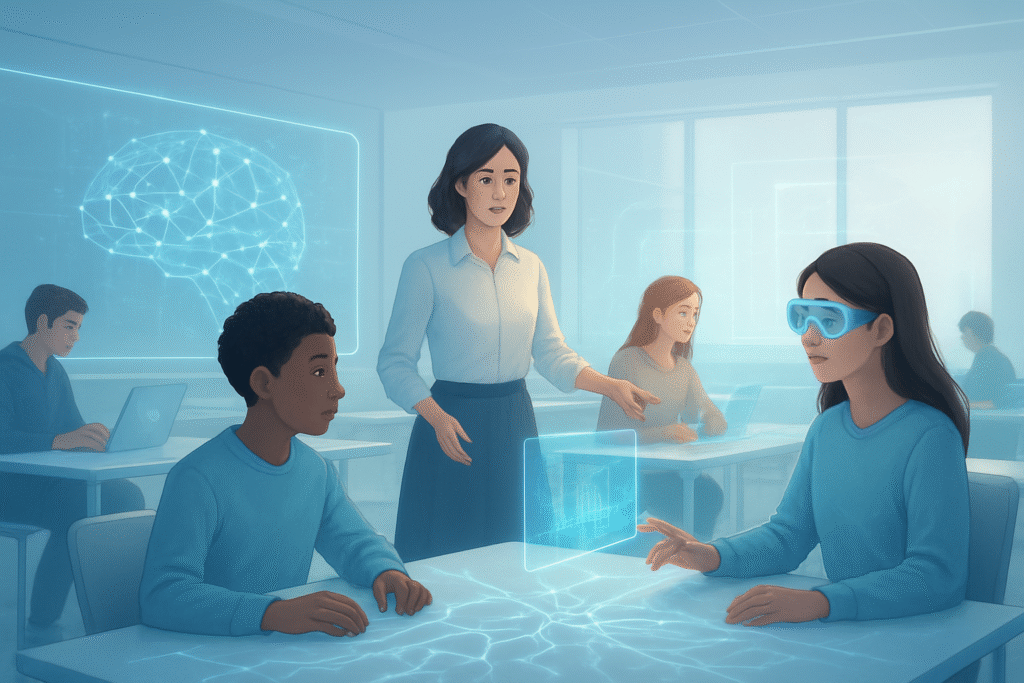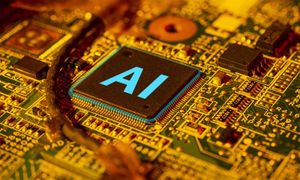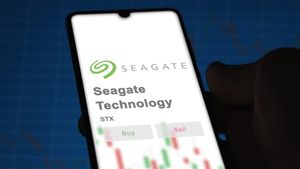
Palm Beach County Schools is rapidly emerging as a national frontrunner in the thoughtful integration of artificial intelligence into its vast educational ecosystem. With a strategic and phased approach, the district is not merely experimenting with AI tools but is actively developing a comprehensive framework to embed these technologies across all middle and high schools, impacting both instructional methodologies and student support systems. This ambitious initiative, dubbed D1C, signifies a pivotal shift in how one of Florida's largest school districts is preparing its 190,000 students and over 22,000 employees for an AI-driven future, while simultaneously grappling with the complex ethical and practical challenges that come with such widespread adoption.
The initiative's immediate significance lies in its holistic nature. Rather than a piecemeal approach, Palm Beach County is tackling AI integration from multiple angles: empowering staff and students with training, establishing robust ethical guidelines, and providing access to a diverse array of AI tools. This proactive stance positions the district as a vital case study for educational institutions nationwide, demonstrating a commitment to leveraging AI's potential for personalized learning and operational efficiency, while also setting precedents for responsible deployment in a sensitive environment like K-12 education. The ongoing discussions within the School Board regarding policy development, academic integrity, and student privacy underscore the district's recognition of the profound implications of this technological leap.
Unpacking the Technological Blueprint: AI Tools Redefining the Classroom Experience
The Palm Beach County Schools' AI initiative is characterized by the strategic deployment of several cutting-edge AI technologies, each serving distinct educational and operational purposes. At the forefront of instructional AI is Khanmigo, an AI-powered virtual tutor and teaching assistant developed by Khan Academy, which began its rollout in select high schools in January 2024 and expanded to all middle and high schools by the start of the 2024-2025 academic year. Khanmigo's technical prowess lies in its ability to guide students through complex problems without directly providing answers, fostering deeper understanding and critical thinking. For educators, it acts as a powerful assistant for lesson planning, content creation, and even grading, significantly reducing administrative burdens.
Beyond personalized tutoring, the district is exploring a suite of generative AI tools to enhance creativity and streamline processes. These include Adobe Express and Canva for design and presentation, Adobe Firefly for generative art, and Google Gemini (NASDAQ: GOOGL) and ChatGPT for advanced content generation and conversational AI. Teachers are leveraging these platforms to create dynamic learning materials, personalize assignments, and explore new pedagogical approaches. Furthermore, Clear Connect has been introduced to support non-English speaking students by delivering lessons in their native language concurrently with English instruction, a significant step forward in equitable access to education.
This multi-faceted approach represents a considerable departure from previous technology integrations in education, which often focused on static digital resources or basic learning management systems. The current AI tools offer dynamic, interactive, and adaptive capabilities that were previously unimaginable at scale. For instance, Khanmigo's personalized guidance transcends the capabilities of traditional online tutorials, offering real-time, context-aware support. Similarly, the proactive, AI-powered student monitoring system, Lightspeed Alert from Lightspeed Systems, piloted in ten schools at the start of the 2024-2025 school year, marks a shift from reactive disciplinary measures to predictive identification of potential threats like self-harm, violence, and bullying by continuously scanning student device activity, even on personal devices used at home. This level of continuous, AI-driven oversight represents a significant evolution in student safety protocols. Initial reactions from the educational community within Palm Beach County have been a mix of excitement for the potential benefits and cautious deliberation regarding the ethical implications, particularly concerning data privacy and academic integrity, which are central to the School Board's ongoing policy discussions.
Reshaping the Landscape: Implications for AI Companies and Tech Giants
The ambitious AI integration by Palm Beach County Schools holds significant implications for a diverse array of AI companies, tech giants, and burgeoning startups. Companies specializing in educational AI platforms, such as Khan Academy, the developer of Khanmigo, stand to benefit immensely. The successful large-scale deployment of Khanmigo within a major school district provides a powerful case study and validation for their AI tutoring solutions, potentially paving the way for wider adoption across other districts. This could translate into substantial growth opportunities for companies that can demonstrate efficacy and address educational institutions' specific needs.
Tech giants like Alphabet Inc. (NASDAQ: GOOGL), through its Google Gemini platform and Google Workspace for Education, are also poised to solidify their market position within the educational sector. As districts increasingly rely on generative AI tools and cloud-based collaborative platforms, companies offering integrated ecosystems will gain a competitive edge. Similarly, Adobe Inc. (NASDAQ: ADBE) with its Creative Cloud suite, including Adobe Express and Firefly, will see increased usage and demand as schools embrace AI for creative and presentation tasks, potentially driving subscriptions and expanding their user base among future professionals. The adoption of AI for student monitoring also highlights the growing market for specialized AI security and safety solutions, benefiting companies like Lightspeed Systems.
This widespread adoption could also disrupt existing educational technology providers that offer less sophisticated or non-AI-driven solutions. Companies that fail to integrate AI capabilities or adapt their offerings to the new AI-centric educational paradigm may find themselves struggling to compete. For startups, the Palm Beach County initiative serves as a blueprint for identifying unmet needs within the educational AI space, such as specialized AI ethics training, data privacy compliance tools tailored for schools, or novel AI applications for specific learning disabilities. The district's emphasis on prompt engineering as a necessary skill also creates new avenues for curriculum developers and training providers. The competitive landscape will increasingly favor companies that can offer not just powerful AI tools, but also comprehensive support, training, and robust ethical frameworks for educational deployment.
Broader Significance: AI in Education and Societal Impacts
Palm Beach County Schools' initiative is a microcosm of a broader, accelerating trend in the AI landscape: the integration of artificial intelligence into public services, particularly education. This move firmly places the district at the forefront of a global movement to redefine learning and teaching in the age of AI. It underscores the growing recognition that AI is not merely a tool for industry but a transformative force for societal development, with education being a critical nexus for its application. The initiative's focus on developing ethical guidelines, academic integrity policies, and student privacy safeguards is particularly significant, as these are universal concerns that resonate across the entire AI landscape.
The impacts of this integration are multifaceted. On one hand, the potential for personalized learning at scale, enabled by tools like Khanmigo, promises to address long-standing challenges in education, such as catering to diverse learning styles and paces, and providing equitable access to high-quality instruction. The use of AI for administrative tasks and content creation can also free up valuable teacher time, allowing educators to focus more on direct student interaction and mentorship. On the other hand, the initiative brings to the fore significant concerns. The deployment of student monitoring systems like Lightspeed Alert raises questions about student privacy, surveillance, and the potential for algorithmic bias. The ethical implications of AI-generated content and the challenge of maintaining academic integrity in an era where AI can produce sophisticated essays are also paramount.
This initiative can be compared to previous educational technology milestones, such as the introduction of personal computers in classrooms or the widespread adoption of the internet. However, AI's adaptive and generative capabilities represent a more profound shift, moving beyond mere information access to intelligent interaction and content creation. The district's proactive engagement with these challenges, including ongoing School Board deliberations and plans for AI literacy lessons for students, sets a precedent for how educational institutions can responsibly navigate this transformative technology. It highlights the urgent need for a societal dialogue on the role of AI in shaping the minds of future generations, balancing innovation with ethical responsibility.
The Horizon Ahead: Expected Developments and Future Challenges
Looking ahead, the Palm Beach County Schools' AI initiative is poised for continuous evolution, with several near-term and long-term developments on the horizon. In the near term, we can expect a refinement and expansion of the existing AI tools, with ongoing teacher and student training becoming even more sophisticated. The district's emphasis on "prompt engineering" as a core skill suggests future curriculum developments will integrate AI literacy directly into various subjects, preparing students not just to use AI, but to effectively interact with and understand its capabilities and limitations. Further integration of AI into assessment methods and individualized learning paths, potentially adapting in real-time to student performance, is also a likely next step.
In the long term, experts predict that such initiatives will lead to a more deeply personalized educational experience, where AI acts as a ubiquitous, intelligent assistant for every student and teacher. This could involve AI-powered career counseling, adaptive curriculum design based on evolving industry needs, and even AI-driven insights into student well-being and engagement. Challenges that need to be addressed include ensuring equitable access to these advanced AI tools for all students, regardless of socioeconomic background, and continuously updating AI models and policies to keep pace with rapid technological advancements. The ethical framework, particularly concerning data privacy, algorithmic bias, and the potential for over-reliance on AI, will require constant review and adaptation.
What experts predict will happen next is a greater emphasis on AI governance in education, with more districts following Palm Beach County's lead in developing comprehensive policies. There will also be a surge in demand for educators trained in AI integration and for AI systems specifically designed for educational contexts, moving beyond general-purpose AI. The potential for partnerships with local universities to expand AI-related educational opportunities, as the district is considering, also signals a future where K-12 education becomes a foundational ground for advanced AI learning and research.
A Blueprint for the Future of Education: Key Takeaways and Long-Term Impact
Palm Beach County Schools' initiative to adopt AI technology across its district stands as a significant milestone in the history of educational technology. The key takeaways from this ambitious undertaking are manifold: a commitment to holistic AI integration, a proactive approach to developing ethical guidelines and policies, and the strategic deployment of diverse AI tools to enhance learning and operational efficiency. From personalized tutoring with Khanmigo to proactive student monitoring with Lightspeed Alert, and from generative AI for creative tasks to language support with Clear Connect, the district is demonstrating a comprehensive vision for AI in education.
This development's significance in AI history lies in its potential to serve as a scalable model for public education systems grappling with the transformative power of artificial intelligence. It highlights the critical need for thoughtful planning, continuous stakeholder engagement, and a balanced approach that embraces innovation while rigorously addressing ethical considerations. The ongoing School Board discussions regarding academic integrity, student privacy, and safe AI use are not mere bureaucratic hurdles but essential dialogues that will shape the long-term impact of AI on society through its influence on future generations.
In the coming weeks and months, it will be crucial to watch for the further refinement of the district's AI policies, the outcomes of ongoing pilot programs, and the expansion of AI literacy training for both students and educators. The success of Palm Beach County Schools in navigating these complexities will offer invaluable lessons for other educational institutions globally, solidifying its role as a pioneer in charting the course for an AI-integrated future of learning. The careful balance between technological advancement and human-centric education will define the legacy of this initiative.
This content is intended for informational purposes only and represents analysis of current AI developments.
TokenRing AI delivers enterprise-grade solutions for multi-agent AI workflow orchestration, AI-powered development tools, and seamless remote collaboration platforms.
For more information, visit https://www.tokenring.ai/.





